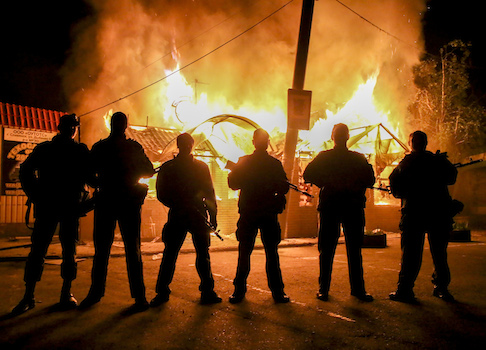Pro-Russian separatists have threatened to bar more than half of residents in eastern Ukraine from voting in the Sunday presidential election, a crucial turning point for the country’s future, experts said on Friday.
The election is the first chance for Ukrainians to elect new leaders since pro-Russian President Viktor Yanukovych was ousted in February by protesters seeking closer ties with the European Union (EU). Violence threatens to mar the electoral process in the East, where the separatists have repeatedly attacked convoys of government troops near the border with Russia.
As many as 500 insurgents attacked a convoy on Thursday in the eastern region of Luhansk, which along with the Donetsk region declared independence from the central government in Kiev in referendums that were widely viewed as illegitimate. Twenty rebels were reportedly killed in the Thursday clash and one soldier was later killed on early Friday.
Armed insurgents have blocked at least half of the regional election committees in Donetsk and Luhansk, according to reports. A recent survey by the International Foundation for Electoral Systems (IFES) found that 62 percent of Ukrainians in the East said they were somewhat or very likely to vote, but many might not be able to.
"Half of the population in those regions are willing to vote, but they can’t do so because the streets in some cities are taken by the militants," said Ievgen Vorobiov, a Ukrainian analyst at the Polish Institute of International Affairs on a conference call hosted by the Foreign Policy Initiative (FPI).
Russian President Vladimir Putin said at a St. Petersburg investment forum on Friday that the Russian government would "respect the choice of the Ukrainian people." He continued to deny that the Kremlin had any involvement in the "chaos" in eastern Ukraine and said it was triggered by the West’s support for the "coup" that caused Yanukovych to flee.
James Kirchick, a journalist and FPI fellow who recently visited Kiev and Odessa, said Putin’s remarks—a shift from his previous comments questioning the legitimacy of the election—should not be taken "at face value."
"I think [Putin] will actually use as a pretext the fact that there has been chaos and violence in the East—which ironically he’s been fueling—the Russian government may use that as an excuse later on to deny the legitimacy of these elections," he said.
Kirchick noted that 16 Ukrainian soldiers were reportedly killed on Thursday in an ambush on a military checkpoint in Donetsk, which is "a lot" for a military that has about 6,000 combat-ready troops. Russian forces have amassed about 40,000 troops near Ukraine’s eastern border in recent months.
"If you can keep this kind of low-level insurgency running for a long time, you basically paralyze the state," he said. "You paralyze Ukriane."
The United States and EU have imposed targeted sanctions on Russian government officials involved in the unrest in Ukraine, but have so far been reluctant to apply broader restrictions on sectors of the Russian economy. Kirchick said the United States is a large source of foreign direct investment for Russia but only conducts a small percentage of its trade with Russia, meaning more onerous sanctions could still be imposed without hurting the U.S. economy.
"We have a lot of leverage there that we’re not using," he said. "The same goes for the Europeans."
Petro Poroshenko, a pro-Western billionaire known as the "Chocolate King" for his business, is expected to win the presidency, though he might not prevail until a second round in June.
Poroshenko has pledged to integrate more closely with Europe but also has deep business interests in Russia, a cause for concern among some analysts. Vorobiov said Russia could try to indirectly influence Poroshenko’s administration through his ties to Russian oligarchs.
Kirchick said the Ukrainian people will ultimately have to make reforms to chart an independent path from Russia, including rooting out corruption and decentralizing some matters of governance.
"A lot of this is incumbent upon the Ukrainians themselves to change their political system so they are able to integrate in the European economy and Western economy and escape from the Russian system," he said.
